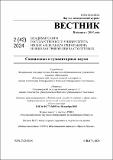| dc.contributor.author | Жигалова, Мария Петровна | |
| dc.coverage.spatial | Владимир | ru_RU |
| dc.date.accessioned | 2024-11-12T14:08:44Z | |
| dc.date.available | 2024-11-12T14:08:44Z | |
| dc.date.issued | 2024 | |
| dc.identifier.citation | Жигалова, М. П. Родина, любовь, человеческая душа в лирике Виктора Крупника: практика интерпретации и анализа / М. П. Жигалова. – Текст : непосредственный // Вестник Владимирского государственного университета имени Александра Григорьевича и Николая Григорьевича Столетовых. Серия: Социальные и гуманитарные науки. – 2024. – № 2 (42). – С. 39–50. – Библиография: 5 назв. | ru_RU |
| dc.identifier.uri | https://rep.bstu.by/handle/data/46251 | |
| dc.description | Zhigalova M. P. Homeland, love, the human soul in the lyrics of Viktor Krupnik: interpretation and analysis | ru_RU |
| dc.description.abstract | В статье проанализированы стихи «С иронией…», «Это наш был мотив…», «На вершине любви…», взятые из сборника «Зелёный остров» Виктора Крупника, московского поэта-эмигранта XX века, в которых отразилась человеческая душа, умеющая любить родину и народ. На основе авторской теории и практики интерпретации и анализа лирического произведения определена структура анализа, в которой важную роль играет сопряженность дотекстовой фоновой информации с сильными позициями, а лексических единиц, ритма и рифмы, средств выразительности – с их влиянием на определение темы и идеи произведения, динамику развития характера лирического героя, а значит, и на широкие философские обобщения читателя, формирующие его мировоззрение. | ru_RU |
| dc.language.iso | ru | ru_RU |
| dc.publisher | ВлГУ | ru_RU |
| dc.subject | литературоведение | ru_RU |
| dc.subject | literary criticism | ru_RU |
| dc.title | Родина, любовь, человеческая душа в лирике Виктора Крупника: практика интерпретации и анализа | ru_RU |
| dc.type | Статья (Article) | ru_RU |
| dc.identifier.udc | 82.09 | ru_RU |
| dc.abstract.alternative | The article analyzes the poems «With irony ...», «This was our motive ...», «On top of love ...», taken from the collection «Green Island» by Viktor Krupnik, a Moscow emigrant po-et of the XX century, which reflected the human soul, able to love the motherland and the people. Based on the author's theory and practice of interpretation and analysis of a lyrical work, the structure of analysis is determined, in which the conjugation of pre-textual back-ground information with strong positions, and lexical units, rhythm and rhyme, means of ex-pression with their influence on the definition of the theme and idea of the work, on the dy-namics of the development of the character of the lyrical hero, and therefore on broad philo-sophical generalizations of the reader, forming his worldview. | ru_RU |

